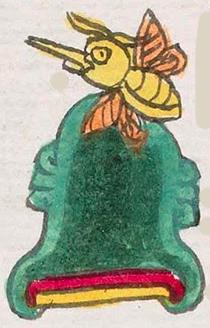Pipiyoltepec (Mdz16r)
This compound glyph, standing for the place name Pipiyoltepec, has two prominent elements. One is the mountain honey bee (pipiyolin) and the other is a hill or mountain (tepetl). The bee flies over or sits on top of the hill. Its head and body are yellow, and its wings are an orange or terracotta color. The head seems to have a significant beak or stinger below the one eye that is visible (given the profile view, facing to the viewer's left). Two curving antennae appear on the top of the head. The hill or mountain is a classic glyph with a two-tone green bell shape, yellow and red horizontal stripes near the base, and curling, rocky outcroppings on the slopes. The locative suffix (-c) (as given in the gloss) is not shown visually, but it combines with -tepe- to form -tepec, a visual locative suffix meaning "on the hill" or "on the mountain."
Stephanie Wood
The bee could be singular or plural in the place name. The Pipi- is not necessarily a plural-reduplication. Karttunen suggests that the name of the bee may relate to the verb pihpi, to gather, as in gathering nectar and pollen.
Stephanie Wood
pipiyoltepec.puo
Pipiyoltepec, pueblo
Stephanie Wood
c. 1541, or by 1553 at the latest
Stephanie Wood
mountains, hills, montañas, cerros, bees, abejas, nombres de lugares

pipiyol(in), mountain honey bee, https://nahuatl.wired-humanities.org/content/pipiyolin
-tepec, on the hill or mountain, https://nahuatl.wired-humanities.org/content/tepec
"On the Hill of the Mountain Honey Bees" (concurring with Berdan and Anawalt) [Frances Karttunen, unpublished manuscript, used here with her permission.]
"On the Hill of the Mountain Honey Bees" (Berdan and Anawalt, 1992, vol. 1, 199)
"El Cerro (o la Montaña) de la Abeja Montesa de Miel"
Stephanie Wood, drawing from Alonso de Molina
Codex Mendoza, folio 16 recto, https://digital.bodleian.ox.ac.uk/objects/2fea788e-2aa2-4f08-b6d9-648c00..., image 42 of 188.
The Bodleian Libraries, University of Oxford, hold the original manuscript, the MS. Arch. Selden. A. 1. This image is published here under the UK Creative Commons, “Attribution-NonCommercial-ShareAlike 3.0 License” (CC-BY-NC-SA 3.0).



